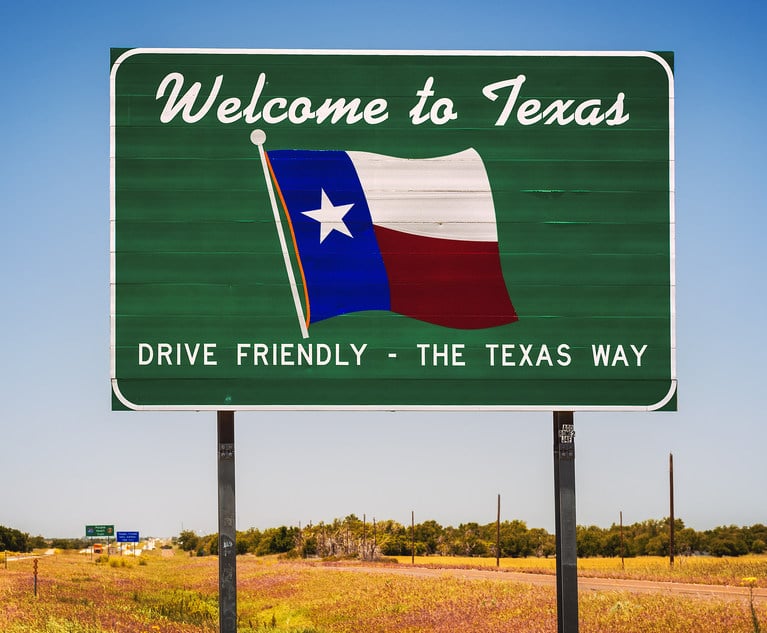Kirkland & Ellis Backs Off Mandatory Arbitration for Staffers
Law student activists combating mandatory arbitration in Big Law have notched another win, but it's uncertain whether the firm will abolish the policy for partners.
December 07, 2018 at 02:55 PM
4 minute read
 Photo: Diego M. Radzinschi
Photo: Diego M. Radzinschi
Nonattorney employees at Kirkland & Ellis will no longer be required to sign mandatory arbitration agreements, amid pressure from law students who say such arrangements disproportionately hurt women and minorities.
“The Firm Committee has now also determined to extend that policy so that the Firm will no longer require arbitration of any employment disputes that may be brought by any employee who is not an attorney,” reads in internal firm memo obtained by Law.com. (A law firm spokesman did not respond to a request for comment Friday on the change.)
Kirkland's reversal on mandatory arbitration on Thursday for nonattorneys comes three weeks after it did away with such agreements for summer associates and associates, and a month after students at Harvard Law School's Pipeline Parity Project called on classmates to boycott the firm during the upcoming summer associate recruiting season. The group says that the agreements are coercive and eliminate the ability of employees to sue over workplace violations such as harassment and discrimination.
The Harvard Women's Law Association put additional pressure on Kirkland, informing it in November that the group would no longer accept $25,000 annually from the firm to be the primary sponsor of its spring conference as long as it required any employees to sign mandatory arbitration agreements. The group released a statement in late November that said eliminating mandatory arbitration only for associates and summer associates still left others vulnerable.
Association president Isabel Finley cautioned Friday that Kirkland's latest announcement still does not specify whether partners and of counsel are required to submit to mandatory arbitration, which is a key issue for the group.
“While I'm very glad to hear that nonattorney staff will no longer be subject to these provisions at Kirkland & Ellis, I am disappointed that today's announcement remains silent on the status of these provisions for partners and counsel,” Finley said. “Unfortunately, the ways in which law firms have sought to enforce these contracts against partners in gender discrimination suits seem to continue to be overlooked in this conversation.”
Finley said the association stands by its position that it will not accept funds or promote employment at Kirkland or any other firm that requires attorneys or employees to sign mandatory arbitration agreements.
“While partners obviously have an income and earning potential that give them far more power than the average American worker subject to mandatory arbitration, their ability to vindicate their equal rights in court is nonetheless critical to ensuring women can go as far as men in their careers,” Finley said.
Sidley Austin announced it was doing away with mandatory arbitration for all employees shortly after Kirkland found itself in the crosshairs of law student activists, while the students have moved on to target DLA Piper with a #DumpDLA campaign. (DLA Piper has defended its use of mandatory arbitration, saying it can be beneficial to both parties.) Meanwhile, women's groups at more than nine top law schools have pledged to forgo funding from firms that either use mandatory arbitration or do not disclose whether they do so.
Student organizers with the Pipeline Parity Project hailed Kirkland's latest move as a step in the right direction, but said they will continue to monitor the firm and its application of the new policies.
“There's a clear consensus emerging in big law that forced arbitration is bad for workers and bad for businesses, and we're glad that Kirkland has followed the path taken by Sidley,” said Pipeline Parity Project organizer Molly Coleman. “They've recognized that if a policy isn't good enough to subject attorneys to, it is not morally defensible to subject nonattorney staff members to the same policy. We hope that lawyers at Kirkland, Sidley, and others will consider their moral responsibility to not enforce these types of coercive contracts on behalf of their clients as well.”
Read more:
This content has been archived. It is available through our partners, LexisNexis® and Bloomberg Law.
To view this content, please continue to their sites.
Not a Lexis Subscriber?
Subscribe Now
Not a Bloomberg Law Subscriber?
Subscribe Now
NOT FOR REPRINT
© 2024 ALM Global, LLC, All Rights Reserved. Request academic re-use from www.copyright.com. All other uses, submit a request to [email protected]. For more information visit Asset & Logo Licensing.
You Might Like
View All
'Further Investment in Power' Will Drive Big Law Business—But What About Clean Energy Projects?
6 minute read
Legal Departments Gripe About Outside Counsel but Rarely Talk to Them
4 minute read
As Profits Rise, Law Firms Likely to Make More AI Investments in 2025

Trending Stories
- 1Call for Nominations: Elite Trial Lawyers 2025
- 2Senate Judiciary Dems Release Report on Supreme Court Ethics
- 3Senate Confirms Last 2 of Biden's California Judicial Nominees
- 4Morrison & Foerster Doles Out Year-End and Special Bonuses, Raises Base Compensation for Associates
- 5Tom Girardi to Surrender to Federal Authorities on Jan. 7
Who Got The Work
Michael G. Bongiorno, Andrew Scott Dulberg and Elizabeth E. Driscoll from Wilmer Cutler Pickering Hale and Dorr have stepped in to represent Symbotic Inc., an A.I.-enabled technology platform that focuses on increasing supply chain efficiency, and other defendants in a pending shareholder derivative lawsuit. The case, filed Oct. 2 in Massachusetts District Court by the Brown Law Firm on behalf of Stephen Austen, accuses certain officers and directors of misleading investors in regard to Symbotic's potential for margin growth by failing to disclose that the company was not equipped to timely deploy its systems or manage expenses through project delays. The case, assigned to U.S. District Judge Nathaniel M. Gorton, is 1:24-cv-12522, Austen v. Cohen et al.
Who Got The Work
Edmund Polubinski and Marie Killmond of Davis Polk & Wardwell have entered appearances for data platform software development company MongoDB and other defendants in a pending shareholder derivative lawsuit. The action, filed Oct. 7 in New York Southern District Court by the Brown Law Firm, accuses the company's directors and/or officers of falsely expressing confidence in the company’s restructuring of its sales incentive plan and downplaying the severity of decreases in its upfront commitments. The case is 1:24-cv-07594, Roy v. Ittycheria et al.
Who Got The Work
Amy O. Bruchs and Kurt F. Ellison of Michael Best & Friedrich have entered appearances for Epic Systems Corp. in a pending employment discrimination lawsuit. The suit was filed Sept. 7 in Wisconsin Western District Court by Levine Eisberner LLC and Siri & Glimstad on behalf of a project manager who claims that he was wrongfully terminated after applying for a religious exemption to the defendant's COVID-19 vaccine mandate. The case, assigned to U.S. Magistrate Judge Anita Marie Boor, is 3:24-cv-00630, Secker, Nathan v. Epic Systems Corporation.
Who Got The Work
David X. Sullivan, Thomas J. Finn and Gregory A. Hall from McCarter & English have entered appearances for Sunrun Installation Services in a pending civil rights lawsuit. The complaint was filed Sept. 4 in Connecticut District Court by attorney Robert M. Berke on behalf of former employee George Edward Steins, who was arrested and charged with employing an unregistered home improvement salesperson. The complaint alleges that had Sunrun informed the Connecticut Department of Consumer Protection that the plaintiff's employment had ended in 2017 and that he no longer held Sunrun's home improvement contractor license, he would not have been hit with charges, which were dismissed in May 2024. The case, assigned to U.S. District Judge Jeffrey A. Meyer, is 3:24-cv-01423, Steins v. Sunrun, Inc. et al.
Who Got The Work
Greenberg Traurig shareholder Joshua L. Raskin has entered an appearance for boohoo.com UK Ltd. in a pending patent infringement lawsuit. The suit, filed Sept. 3 in Texas Eastern District Court by Rozier Hardt McDonough on behalf of Alto Dynamics, asserts five patents related to an online shopping platform. The case, assigned to U.S. District Judge Rodney Gilstrap, is 2:24-cv-00719, Alto Dynamics, LLC v. boohoo.com UK Limited.
Featured Firms
Law Offices of Gary Martin Hays & Associates, P.C.
(470) 294-1674
Law Offices of Mark E. Salomone
(857) 444-6468
Smith & Hassler
(713) 739-1250










